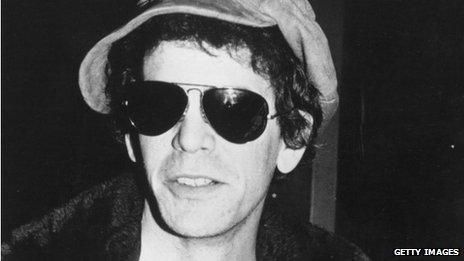Obituary: How Lou Reed shaped rock
- Published
The BBC's entertainment correspondent Colin Paterson assesses Lou Reeds legacy
Lewis Allan Reed, better known as Lou, was a singer and guitarist famous for his deadpan voice and distinctive lyrics.
In a career spanning many decades - both in the band The Velvet Underground and his subsequent solo career - he had a huge influence on the shape of rock music.
Born in Brooklyn in 1942, as a teenager he became a fan of early rock 'n' roll, playing the guitar in several high school bands.
After attending Syracuse University, Reed moved to New York City and worked as a songwriter before meeting the Welsh-born musician John Cale, with whom he would form The Velvet Underground.
The pair, who were interested in combining rock music with the avant-garde, recruited guitarist Sterling Morrison and drummer Maureen Tucker.
With Reed at the helm, they stretched the boundaries of rock 'n' roll. With the frontman's melodic instincts still intact, they added the experimental streak of the art studio and the abrasive realism of 1960s Manhattan.
On top of their musical innovation, the group's lyrics often displayed dark or explicit themes that had rarely had been addressed so openly on record.
They caught the attention of artist Andy Warhol, who became the group's manager and producer.

Reed was regarded as one of the fathers of glam rock, punk and indie
Warhol paired the group with icy-voiced German-born singer Nico - who he billed as "the pop girl of '66" - as well as making them the house band at his seminal Factory studio.
They provided the live soundtrack to Warhol's Exploding Plastic Inevitable events - multimedia shows that paired screenings of the artist's films with dance, live performances and music.
But the shows did not go down well. The Chicago Daily News wrote "The flowers of evil are in full bloom", while pop star Cher was quoted as saying: "It will replace nothing except suicide".
The association with Warhol did not necessarily serve the band well. Many thought the band was an elaborate prank.
Rolling Stone magazine refused to review their debut album, The Velvet Underground & Nico - while New York radio banned it for its explicit references to drugs and sex.
But they persevered - making four records in total, including tracks such as Heroin, which addressed Reed's growing drug use, I'll Be Your Mirror, All Tomorrow's Parties, I'm Waiting For the Man and Sweet Jane.
While their albums gained little attention beyond the underground scene at the time, The Velvet Underground are now considered one of the most influential bands in the history of rock music.
Going solo
After a series of personality clashes, Reed decided to leave Velvet Underground in 1970 and worked for a while in his father's accounting firm.
According to Rolling Stone magazine, he was a virtual recluse during this period - but in 1972 he moved to England, signed a record contract and released his debut solo album, which was simply entitled Lou Reed.
But it is his second solo album, Transformer, that has done the most to cement his reputation as a rock pioneer in his own right.
Lou Reed performs Waiting For The Man on the BBC's Old Grey Whistle Test programme in December 1984
Co-produced by David Bowie, the album contains the classic tracks Walk on the Wild Side, Satellite of Love and Perfect Day.
With the influence of Bowie, Reed embraced the glam rock look of the era, sporting bleach-blond hair and black fingernail polish.
He continued to release solo albums - to mixed reactions - while over the years the legend of The Velvet Underground grew as their music gained recognition and a wider audience.
In 1990, The Velvet Underground reunited in France to play a benefit concert, and a full reunion followed three years later.
The quartet embarked on a European tour - but old differences between Reed and Cale resurfaced on the road and the tour was abruptly cancelled before they reached North America.
Backing singer Casey Synge describes working with Reed on Walk on the Wild Side
Continuing his solo career in typically idiosyncratic style, Reed's later releases ranged from ambient meditation music and spoken word to experimental rock and a collaboration with heavy metal behemoths Metallica.
He also published books of his photography.
Notoriously difficult in interviews, he refused to romanticise the life of a musician, writing in a 1970 essay: "Those who hate the nine-to-five regime do not know the blessing that it holds."
Nonetheless, he was passionate about his work, telling Spin Magazine, external in 2010: "I'm writing about real things. Real people. Real characters.
"You have to believe what I write about is true or you wouldn't pay any attention at all."
He added, however: "The work is never as good as it could be."
A long-time user of drink and drugs, Reed contracted hepatitis in the early '60s by sharing a needle with another user, called Jaw for his "mashed-in", "split-level" face.
Although he eventually overcame his addictions, Reed became ill from liver failure in 2013, and had a transplant in May. "I am a triumph of modern medicine," he posted on his website in June.
As recently as September, he told BBC 6 Music he felt "great".
"As long as a cinder block doesn't fall on me, or I don't trip over a cable and get run over by a car, everything's good," he said.
Reed's first marriage, to British designer Sylvia Morales, ended in divorce. In 2008, he married his long-term partner, the musician and performance artist Laurie Anderson.
- Published27 October 2013
- Published29 October 2013
- Published27 October 2013